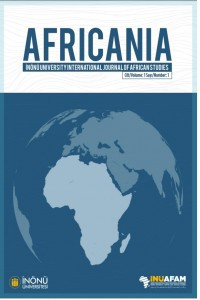Terrorism in Mozambique: Analysis of the factors that challenged the Mozambican government on resolution of the problem
2017 yılı, Mozambik'te terörizm olarak kabul edilen bir dizi saldırının başlangıcına işaret etmektedir. Kimliği bilinmeyen bir grup militanın 3 Mozambik polis karakoluna saldırmasıyla başlamıştır. Bu grubun gerçekleştirdiği saldırılar, 4000'den fazla vatandaşın ölümüne ve yarım milyondan fazla vatandaşın yerinden edilmesine neden olmuştur. Bu araştırma, Mozambik Hükümeti'nin ülkedeki gaz arama projelerinin askıya alınmasına neden olan ve geleceğini olumsuz etkileyen bu sorunu etkili bir şekilde çözmesini engelleyen faktörlerin belirlenmesi açısından önemlidir. Sorunun anlaşılmaması, militanlarla başa çıkmak için deneyim ve ekipman eksikliği ve askeri operasyonlara odaklanma Mozambik Hükümeti'nin Cabo Delgado'daki duruma etkili bir çözüm bulmasını engellemiştir. Araştırmayı yürütmek için söylem analizi, belgesel ve bibliyografik teknikler kullanılmıştır, çünkü araştırma sırasında soruşturmaya yardımcı olması için resmi belgeler kullanılmıştır. Ayrıca, ikincil kaynaklar, diğer araştırmacılar tarafından yürütülen çalışmaların analizi, sorunun daha iyi anlaşılmasını sağlamıştır ve araştırma probleminin cevabının kapsamını genişlemiştir.
TERRORISM IN MOZAMBIQUE: ANALYSIS OF THE FACTORS THAT CHALLENGED THE MOZAMBICAN GOVERNMENT ON RESOLUTION OF THE PROBLEM
The year of 2017 marks the beginning of a series of attacks which are considered to be terrorism in Mozambique. It started as a group of militants of unknown identity attacked 3 Mozambican police stations. The attacks carried out by this group resulted in the death of more than 4000 citizens as well as the displacement of more than half a million citizens. This research is important insofar as it seeks to determine the factors that prevented the Mozambican Government from efficiently resolving this problem that led to the suspension of gas exploration projects in the country, a fact that negatively affects its future. Lack of understanding of the problem, lack of experience and equipment to deal with the militants, as well as the focus on military operations, only prevented the Mozambican Government from finding an efficient solution to the situation in Cabo Delgado. In order to carry out the research, speech analysis, documentary and bibliographic techniques are used, since during the research, official documents were used in order to assist the investigation. Moreover, secondary sources, the analysis of works carried out by other researchers, allowed a better understanding of the problem and broadened the scope of the answer to the research problem.
Keywords:
Terrorism, insurgency, Africa, Mozambique, natural gas.,
___
- Assembleia da República. (2018). Lei 5/2018 de 2 de Agosto. (I série número 151). República de Moçambique.
- Assembleia da República. (2022). Lei 13/2022 de 8 de Julho. (I série número 131). República de Moçambique Cabo Delgado: “Crise mais grave pode ser evitada” em Moçambique, diz enviado. (2020). ONU News. https://news.un.org/pt/story/2020/12/1735092 Declaration on Terrorism. (2002).
- Demir, C. K. (2013). Terörizmle mücadelede görüşmeler. Uluslararası İlişkiler. 10(38): 29-54.
- Demir, C. K. (2016). Ayaklanmalardan terörizmle mücadeleye öğrenen askeri örgütler. Savunma Bilimleri Dergisi. 15(2): 107-136.
- Devermont, J. & Columbo, E. (2019). “Conflict at a Crossroads.” Northern Mozambique at a Crossroads: Scenarios for Violence in the Resource-Rich Cabo Delgado Province. Center for Strategic and International Studies. 1–6. https://www.jstor.org/stable/resrep22604.4
- Estelle, E. Darden, J. T. (2021). “Assessing the Northern Mozambique insurgency. In combating the Islamic State’s spread in Africa: ASSESSMENT AND RECOMMENDATIONS FOR MOZAMBIQUE. American Enterprise Institute. 5-16. http://www.jstor.org/stable/resrep30196.5
- Yayın Aralığı: Yılda 2 Sayı
- Başlangıç: 2021
- Yayıncı: İnönü Üniversitesi
